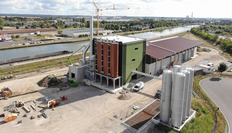- Seraplant invested over 20 million euros in the new facility.
- The plant aims to produce 60,000 metric tons of phosphate fertilizer annually.
- The construction period lasted 20 months, with commissioning on May 31, 2021.
- The process recycles sewage sludge ash into phosphate fertilizers.

Introduction
After a 20-month construction period, the first production plant for phosphate-containing fertilizers made from recycled sewage sludge ash is now operational in Haldensleben, Germany. The plant is operated by Seraplant, with Glatt Ingenieurtechnik responsible for process development and construction.
Investment and Capacity
Seraplant invested over 20 million euros in the new facility, supported by the state of Saxony-Anhalt. The plant aims to produce 60,000 metric tons of phosphate fertilizer annually, creating over 20 new jobs in the region.
Production Process
The production process, jointly developed by Seraplant and Glatt, is highly efficient and patent-pending. It combines phosphorus recycling with fertilizer manufacturing, resulting in market-ready products. Glatt handled the complete plant technology, from raw material delivery to the final product.
Regulatory Compliance
Germany's lack of natural phosphorus deposits and the Sewage Sludge Ordinance have necessitated phosphorus recovery. The new plant ensures compliance with the German Fertilizer Ordinance (DüMV) and supports sustainable sewage sludge utilization.
Sustainability
The Haldensleben plant recovers phosphorus from sewage sludge ash without producing hazardous intermediates, residues, or waste gases. This contributes significantly to the sustainable and resource-conserving use of phosphorus, an essential nutrient.
Future Plans
Development partners Glatt and Seraplant are planning further phosphorus recovery projects to enhance sustainability in the industry.

